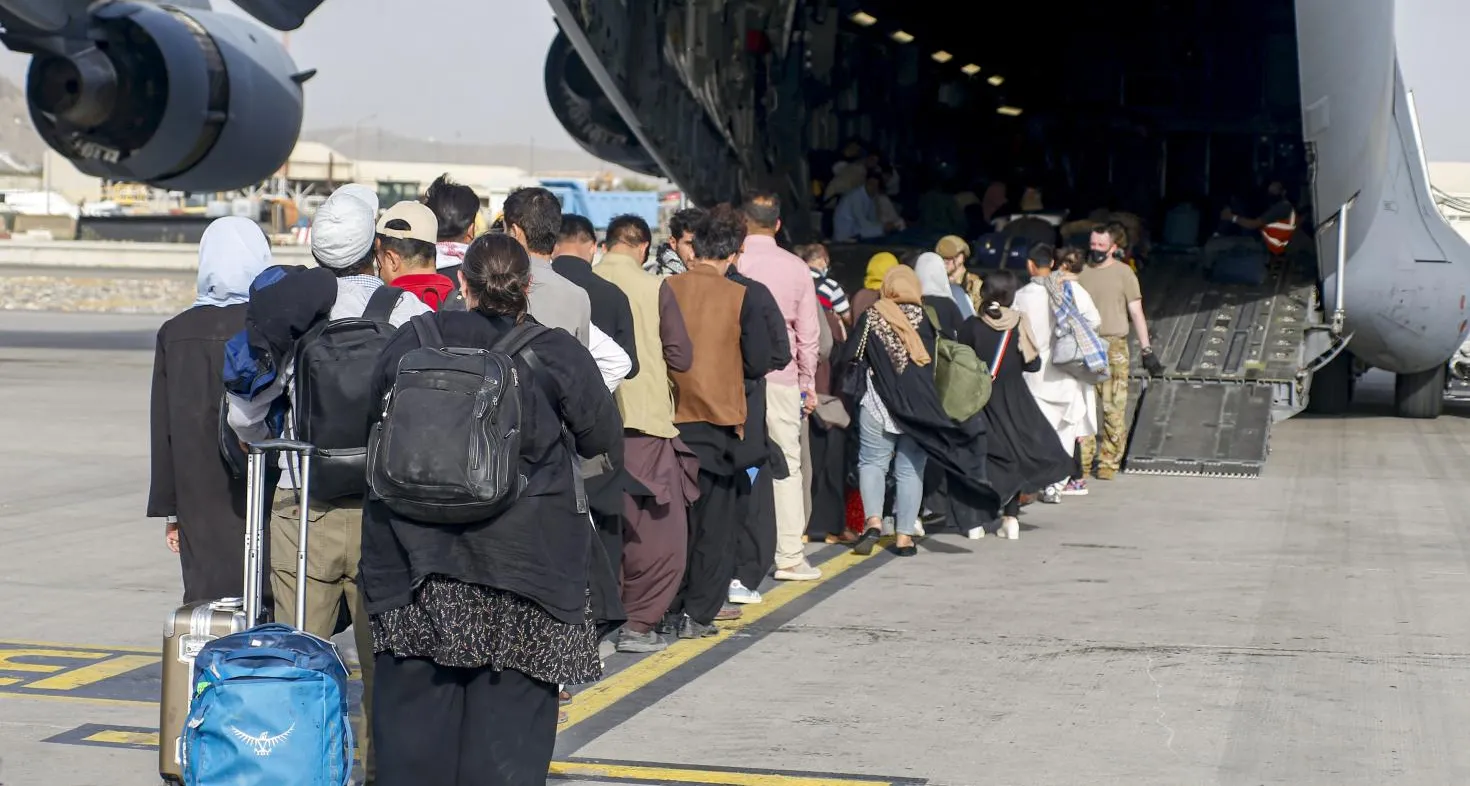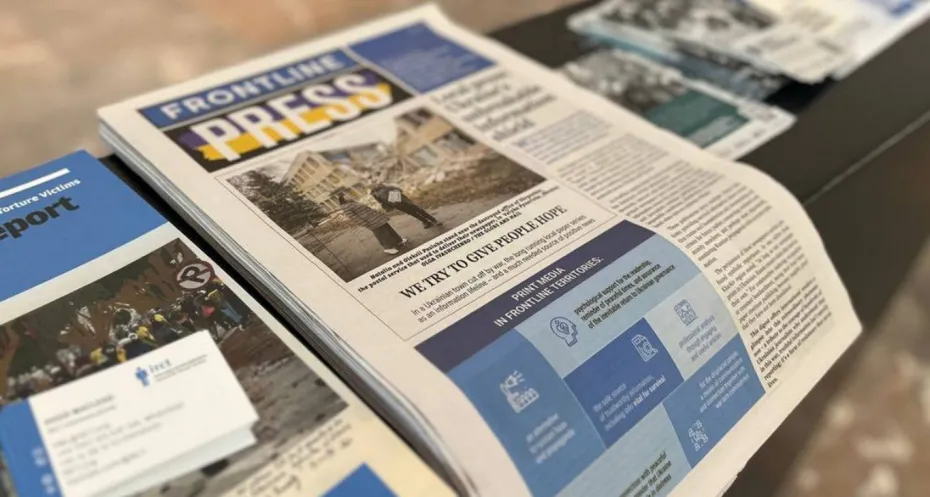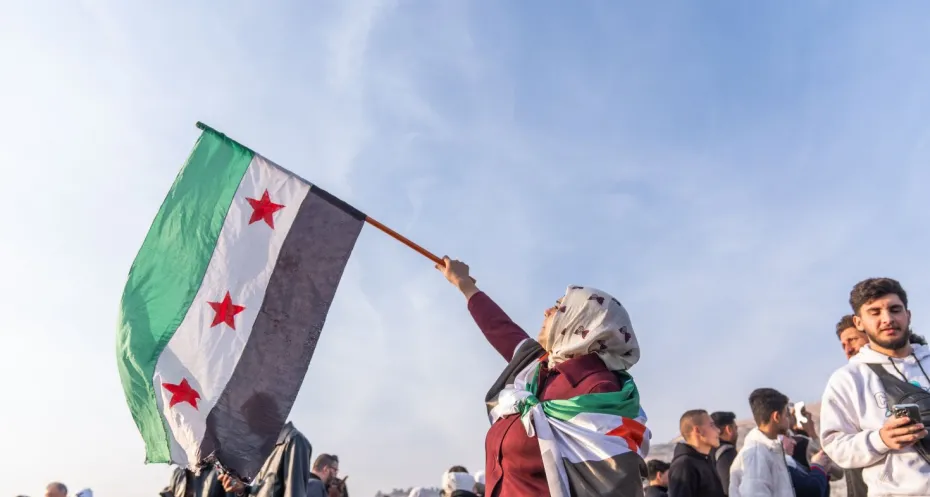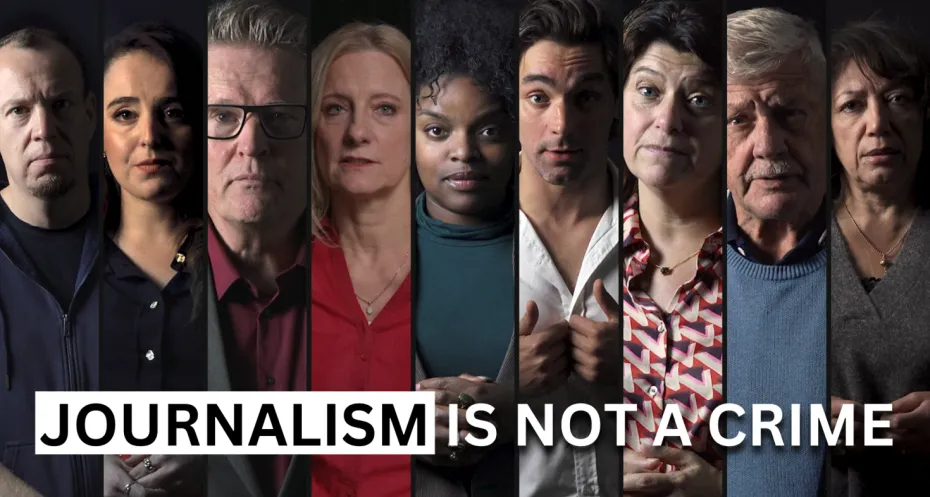
1 year since the fall of Kabul: a detailed account of the evacuation
When the Taliban gained more and more territory, eventually entered Kabul, and took control over Afghanistan, it was pure chaos. For Free Press Unlimited it was an unprecedented crisis situation as well, that required our emergency team to work day and night to help keep journalists and fixers safe. We did not do that alone.
The emergency team collaborated with many other organisations and individuals with contacts in either Afghanistan or Pakistan who could assist with the evacuation. One of these pivotal liaisons was journalist Tahir Imran. Tahir worked for BBC Urdu that is part of BBC World Service until 2020 and works as a freelancer ever since. In this interview we speak to him about his role during the evacuation.
What is your relation with the situation in Afghanistan?
“I have done all sorts of journalism, but one of the things I was really keen on and had huge interest in, was aviation. This is something which accidentally brought me to Afghanistan. As an aviation journalist you are connected to airlines and have contacts among airline executives and officials. After the Taliban took Kabul, a friend of mine, who works for Free Press Unlimited now, approached me and asked if I could help with evacuating a group of LGBTQI members from Afghanistan, and after that I started helping to evacuate journalists as well.
Help was needed with organising the flights at first, and then getting tickets or finding the right connections for flights. When I decided to help with that, I found the opportunity to organise special charters with the support of Pakistan International Airlines (PIA). With this airline we evacuated journalists, but also human rights defenders, women's rights defenders, authors, judges and police officials who were fleeing Afghanistan, in over 12 evacuation flights. So that's how I accidentally became somebody who was helping in this crisis.”
What obstacles did you encounter?
“I think the biggest challenge at that time was that nobody knew what to do. There were many people who needed help, but the ways to offer help were limited. There were organisations who had money, but where and how to spend that money? For example, people needed visas, people needed support with fleeing the country, and people needed security advice via on the ground contacts. So I asked the CEO of Pakistan International Airlines (PIA), Air Marshal Arshad Malik, if he could help with organising charter flights. With his active support and help we reached out to the Pakistani ambassador and the Pakistani government, requesting them to issue visas for people who were traveling with PIA. Without the help of PIA, CEO Air Marshal Arshad Malik, and its Public Affairs manager Abdullah Khan, I think we couldn’t have achieved anything. They were a source of rock solid support throughout this crisis.
A huge challenge was that, at that time, online visa applications were not available. So we had to find somebody in Kabul who could take the passports, and then take them to the Pakistani embassy for the application. A whole organic system was created. From August till Christmas, and even after that, we were just going through lists of people, coming from initially just two or three organisations, like Free Press Unlimited. Later on it grew and I have been in touch with over 50 organisations.”
What was it like for you during this period?
“It was very chaotic. I remember the first flight that we organised. I was so nervous. The flight was early in the morning and I couldn't sleep the whole night. We were following the plane in the flight radar app and saw it taking off from Islamabad. That’s like a 45 minute flight. Then it landed in Kabul and the waiting started. People had to go to the check in, go through security. And then, finally, we received the first video of people sitting in the plane.
Things like this made it very heavy, intense work, and very emotional as well. There were many smaller incidents where people were crying, scared that they weren’t going to make it. If there was some kind of spelling mistake or something, the Taliban were not accepting papers. It was a lot of phone calls back and forth. But once the plane took off, we took a sigh of relief.
But then it just kept going. First we thought that it would be just one flight and that's it. Then the planning for the second flight started, and the third and then fourth. A whole new challenge was moving money to Pakistan, because Pakistan is on the Financial Action Task Force grey list. There were a lot of hurdles to take in that regard. It was a crazy time.”
How did you see the danger emerging for journalists specifically?
“Before the Taliban, the media was flourishing, which meant that many journalists were well known, they were recognisable. Because of that, it was not easy for them to leave. Thanks to the Pakistani embassy and some other friends in Afghanistan and Pakistan, we could succeed. They ensured that these people could leave without being obstructed at the airport.
The journalists were really, really scared until the plane took off. We were continuously reassuring them that everything would be okay. It was all so uncertain. You don't know what to expect because the Taliban themselves were not prepared at that time. Different groups of Taliban were controlling different parts of Kabul, like the airport, and controlling posts throughout the city. So you don't know who to talk to if something goes wrong. It was a very messy situation. But fortunately it worked out most of the time. There were a couple of occasions where they refused someone to board, but in most occasions we didn't have a problem.”
What was it like to work with organisations like Free Press Unlimited in that chaotic first few months?
“I think, in fairness, none of the organisations were prepared for this. Most organisations know how to help in a country where there is some kind of structure, there is some kind of a system. There are travel agents, there are flights going. But here, the whole bureaucracy, the whole government just completely disappeared. So you don't know what to do.
Then there were organisations who had money, but lacked the will because they didn't want to get into the unknown. Organisations like Free Press Unlimited, I have huge respect for, because they stepped up and they decided to take the bull by the horn and get into the unknown. And it's a minefield. If you are sending money, you are helping somebody who might be on a hit list, who might be vulnerable, and you don't know who you are dealing with. So it was a risk as well.
The best thing I found about working with Free Press Unlimited was that there was a humane touch in their work. The people I was dealing with, it was not just that they said they cared, you could see their care. They were always there, they were not off on the weekends or evenings, because it was a crisis situation. And I remember that Free Press Unlimited was one of the only organisations that brought these people from Kabul to Islamabad, and then kept supporting them for a long time, until they find that third country where they could go to.”
Did you also hear about journalists who were determined to continue their work, in Afghanistan or from other countries?
“Free Press Unlimited’s director Ruth Kronenburg said something very interesting during one of our meetings, in response to some suggestions who were saying that the journalists that fled Afghanistan could get a job in catering or delivery service or something else. She then made it very clearly that they could have done that in Afghanistan as well, they could start a restaurant or work somewhere else. But they left the country because they wanted to be committed to their profession. We need to be helping these people so they can continue their journalistic work, which is very important.
I think organisations like BBC, CNN, Aljazeera, Voices of Women, Deutsche Welle and others, need to step up and open up ways for these journalists to do their work in exile, provide them with a platform where they can pitch their work and then get their work published or broadcasted. And I know that in that case, if there is an equipment request or something, Free Press Unlimited and other organisations are there to help with that.”
We are a year further now. Organisations like Free Press Unlimited are still working and lobbying for journalists and fixers to get evacuated or be offered a visa to leave the safe house in Pakistan. Do you have any insight into the current situation, where help is still needed?
“There are two big challenges. Before people have gone through the process to receive verified documents, they have no visa and are illegal. That is a big obstacle. Creating some kind of temporary visa for these people, like a six months or one year resident permit, could be really helpful. Then, when the verification is done, they move on to the list of people who can go to a third country. Some of these third countries, especially the Netherlands, need to open more spaces for people who at least have a proven track record in journalism, even if they have not worked with Dutch media. Those should be considered as well.”
Can you share any stories of people you have helped to evacuate?
“There was a case of a woman who was a journalist and human rights activist, and her family. She had a young baby, and when the Taliban took control, they suddenly had to run away. She, her husband, and her son had passports. But the young daughter had no passport yet. This was around the time of the first flight that we were setting up. What to do?
There were no options available anymore to get a passport. And she had to leave because she was in real danger, a life or death situation. She managed to go to a safe place with the help of friends who brought her.
Fortunately, the Chilean government issued them a travel document. But that travel document was in Abu Dhabi, because Chile has no embassy in Pakistan. So how to take them to Dubai? Then with the help of PIA and some kind Pakistani officials somebody from Islamabad got on the plane and went to speak to the Taliban, tried to make sense to them by showing the documents. And I still don’t know how exactly, but they were able to take the baby on the plane. But they had to stay at Islamabad airport for a few hours in transit because they didn't have a visa for Pakistan. Then we arranged for their next flight from Islamabad to Dubai. Pakistan International Airlines spoke to the Dubai government and explained the situation to them, together with the Chilean government. They were able to go and get documents to travel to Santiago. Then the German government gave them approval to come to Germany.
I requested the donor organisation if they could fly via Amsterdam, so I could meet the girl and the family, which was so nice after being so involved.”
It’s interesting to witness so many embassies and governments helping, like Chile or Argentina. It must be very motivating to see that even in a horrible situation, there are good things.
“You know, people sitting in an office in Berlin, Paris, New York or London, they might not hear these individual stories of people. But every single thing, even if you have just bought a ticket for somebody from Kabul to Islamabad, is life changing support. Even if it is a few hundred dollars, it is going to change the life of that individual or that family.
And these personal, individual stories, that is also why independent media, and a free press, is important. And the work that Free Press Unlimited does and the support that they provide is vital. Especially the emergency support. That emergency support is one of the catalysts for the continuation of the work of journalists who want to do right, who want to practice good journalism that creates an impact. Something that they are not able to do anymore in their own country, but with support they can continue it from somewhere else.”
Is there anything else you would like to share?
“I think we are living in an age where journalism is going through a very difficult time. The challenges are not just physical, there are digital challenges as well. There is this whole campaign to discredit the free media and the rights of journalists. And that's why the role of organisations that work to prevent that is very important. And what’s really important is not just the financial support, but also the mental health support, the equipment support, the training support. All of these things help in its own way, in small fractions, in fulfilling the dream of a free, independent media.”



